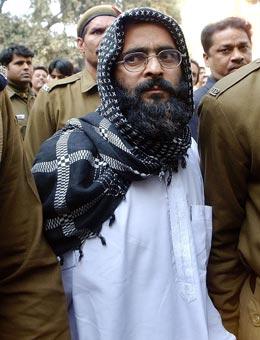Four more on deathrow

The hanging of Afzal Guru on February 9, 2013 and the previous hanging of Ajmal Kasab in November 2012 are a major step back for human rights in India according to the World Sikh Organization of Canada.
The hangings marked the end of an eight year unofficial moratorium on the death penalty in India.
Afzal Guru was convicted for providing logistical support to those involved in the attack on the Parliament building in New Delhi on December 13, 2001, while Ajmal Kasab was convicted of taking part in the 2008 Mumbai attack.
Serious concerns have been expressed by many in India over lapses in procedural fairness in the Afzal Guru case. Guru did not receive proper legal representation and he claimed that his confession, which he later retracted, was extracted under torture. It has been alleged that Guru’s court-appointed junior lawyer did not visit his client even once in jail. No prosecution witness was cross-examined nor was any defence witness presented.
Guru’s appeal for clemency was rejected by President Pranab Mukherjee on February 3. According to reports, Guru was informed of the decision a few hours before his execution and Guru’s family in Kashmir was informed via “speed post” which arrived two days after the hanging was carried out. As a result, Guru was not afforded the opportunity to meet with his family for a final time.
The World Sikh Organization of Canada has previously called on India to join the more than two thirds of countries in the world which have abolished capital punishment.
WSO senior policy advisor Gian Singh Sandhu said, “while terrorist attacks are absolutely reprehensible, capital punishment, or state sanctioned murder, is not the solution. Given the significant procedural fairness lapses that are alleged to have taken place in the Afzal Guru case, this execution raises serious questions over the administration of justice in India.”
WSO President Prem Singh Vinning said, “the two recent executions in India of Ajmal Kasab and Afzal Guru reflect a disturbing pattern. The executions have taken place in relative secrecy and have appeared to be motivated, at least in part, by partisan politics. India should immediately reinstate its moratorium on the death penalty and begin the process of abolishing capital punishment.”
India must immediately halt the impending executions of four prisoners whose mercy petitions – the final course of appeal in the country’s justice system - were rejected by President Pranab Mukherjee, Amnesty International said.
Gnanprakasham, Simon, Meesekar Madaiah and Bilavendran are now at high risk of imminent execution.
The President’s move came just days after the hanging of Afzal Guru – the second execution in India in fewer than three months following an eight-year hiatus.
“This government has executed more people since November 2012 than in the previous ten years. To continue such a regressive trend would be truly shameful,” said G. Ananthapadmanabhan, chief executive of Amnesty International India.
“Given the political climate and the two other recent executions, there is a real concern that these four men will be put to death soon. The Indian government must ensure that this does not happen.”
The four men were convicted in 1993 for their involvement in a landmine blast that killed 22 people, and injured many others, including members of the police who were on their way to arrest the notorious sandalwood smuggler Veerappan in the state of Karnataka.
They were originally sentenced to life imprisonment by a special court in Karnataka set up under the Terrorist and Disruptive Activities Prevention Act (TADA), but on appeal their sentences were increased to the death penalty by the Supreme Court in 2004. They had filed mercy petitions in 2004.
The Supreme Court, in a different case, has said that inordinate delay in deciding on mercy petitions can be a ground for commutation of death sentence. They are reportedly in the process of filing a review petition challenging the rejection of their mercy plea.
Trials under the TADA did not uphold international fair trial standards; provisions of the TADA were also grossly abused in India to facilitate further human rights violations. The TADA was repealed in 1995.
Since November 2012, Indian authorities have not consistently made all the information about the rejection of mercy petitions and dates of execution available to the public prior to sentences being carried out. In one case, the family received the notice of the imminent execution only after it had been carried out.
“This new practice of executing in secret without prior notification to relatives is deeply worrying. We urge the Indian government to immediately establish a moratorium on executions as a first step towards abolition,” Ananthapadmanabhan said.
Amnesty International opposes the death penalty as a violation of the right to life as proclaimed in the Universal Declaration of Human Rights and as the ultimate cruel, inhuman or degrading punishment.
The organization opposes capital punishment in all cases without exception, regardless of the nature or circumstances of the crime; guilt, innocence or other characteristics of the individual; or the method used by the state to carry out the execution.
Leave a comment









